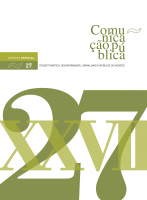Introduction
DOI:
https://doi.org/10.4000/cp.5540Abstract
For a citizen to participate in democracy, they must have access to relevant, truthful, and plural information. The social responsibility of the press—a concept introduced in 1947 by the Hutchins Commission—rests on the fundamental right to inform and to be informed. The journalist plays a socially recognized role in the construction of reality. This is a form of “symbolic power”: an “invisible,” “almost magical” power, one that “makes people see and believe, that confirms or transforms the vision of the world and, in this way, action upon the world, and thus the world itself” (Bourdieu, 1989). In the 1990s, Bourdieu (1997) criticized journalists for holding the de facto monopoly over the instruments of large-scale information dissemination, against which cultural producers struggled. Although media products generate “enormous” externalities (Baker, 2004), the journalistic field is subject to the demands of reader and advertiser markets. However, the low autonomy of the journalistic field, denounced by Bourdieu (1997) in the 1990s, has become even more pronounced in the 21st century—a trend accompanied by the growing loss of journalists’ gatekeeping power (control over the flow of information).
Downloads
References
Alves, R. C. (2006). Jornalismo digital: Dez anos de web... e a revolução continua. Comunicação e Sociedade. 9-10, pp. 93-102. DOI : 10.17231/comsoc.9(2006).1157 good / bad
Anderson, C. (2007). Cauda Longa. Lisboa, Portugal: Atual Editora.
Anderson, C. W., Bell, E., Shirky, C., & Columbia University. (2012). Post-industrial journalism: Adapting to the present: a report. New York: Columbia Journalism School. Disponível em https://academiccommons.columbia.edu/doi/10.7916/D8N01JS7. DOI : 10.7916/D8N01JS7 good / bad
Baker, C. E. (2004). Media, markets, and democracy. Cambridge, Inglaterra: Cambridge University Press. DOI : 10.1017/CBO9780511613227 good / bad
Bourdieu, P. (1997). Sobre a televisão. Oeiras, Portugal: Celta Ed.
Bourdieu, P. (1989). O poder simbólico. Rio de Janeiro, Brasil: Difel.
Castells, M. (2009). Comunicación y poder. Madrid, Espanha: Alianza Editorial.
Engesser, S., Ernst,N., Esser, F., & Büchel, F. (2017). Populism and social media: how politicians spread a fragmented ideology. Information, Communication and Society, 20(8), 1109-1126. DOI : 10.1080/1369118X.2016.1207697 good / bad
Kotler, P. & Armstrong, G. (2017). Principles of Marketing (17ª ed.). Harlow, Inglaterra: Pearson.
Kotler, P., Setiawan, I., & Kartajaya, H. (2017). Marketing 4.0. Lisboa, Portugal: Atual Editora
Wardle, C. & Derakhshan, H. (2017). Information disorder: Toward an interdisciplinary framework for research and policy making. Estrasburgo, França: Council of Europe. Disponível em https://rm.coe.int/information-disorder-toward-an-interdisciplinary-framework-for-researc/168076277c.
Downloads
Published
Issue
Section
License
Copyright (c) 2019 Direitos do Autor (c) 2020

This work is licensed under a Creative Commons Attribution-NonCommercial 4.0 International License.
Os conteúdos da Comunicação Pública estão licenciados com uma licença Creative Commons - Atribuição-NãoComercial 4.0 Internacional.


